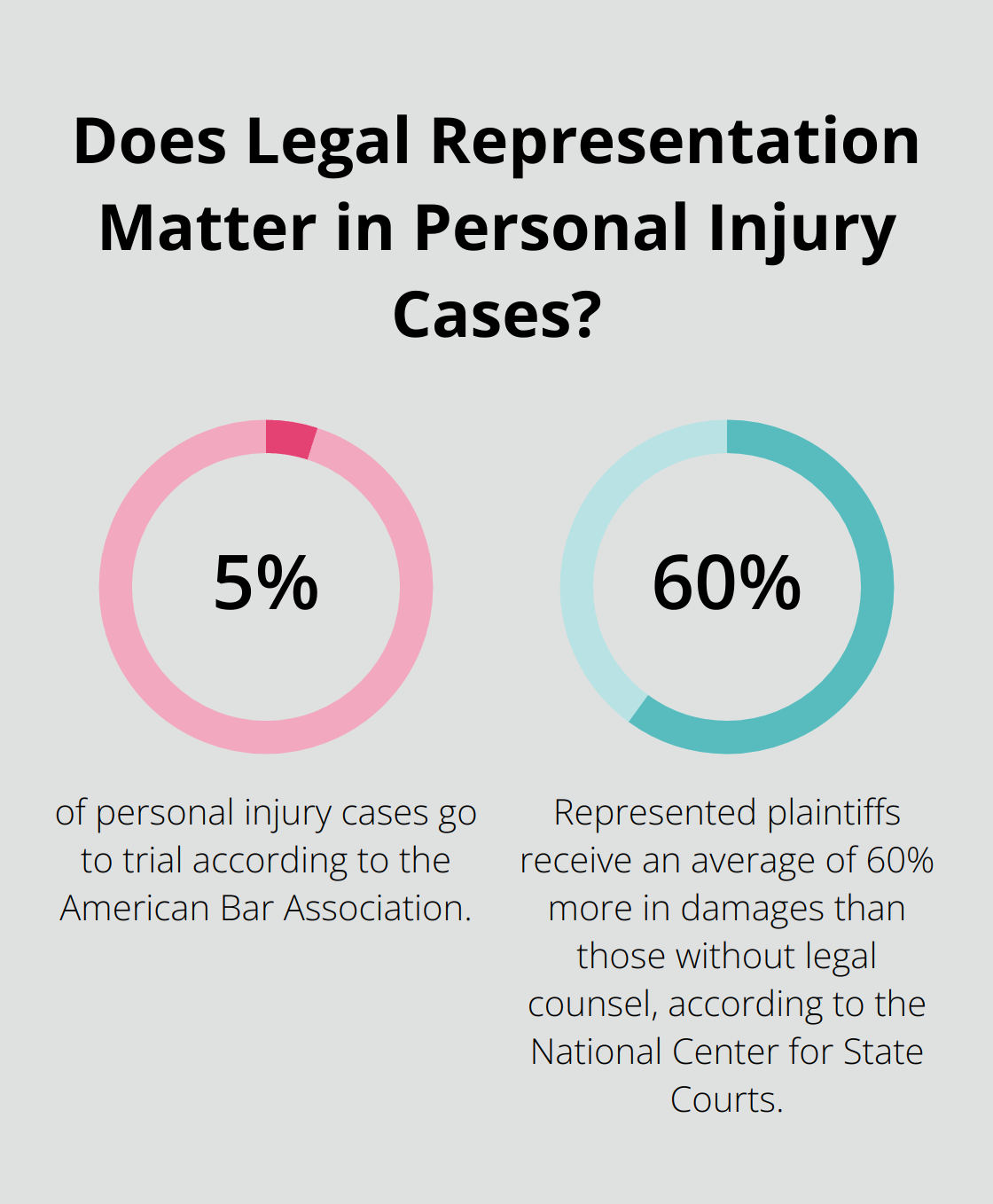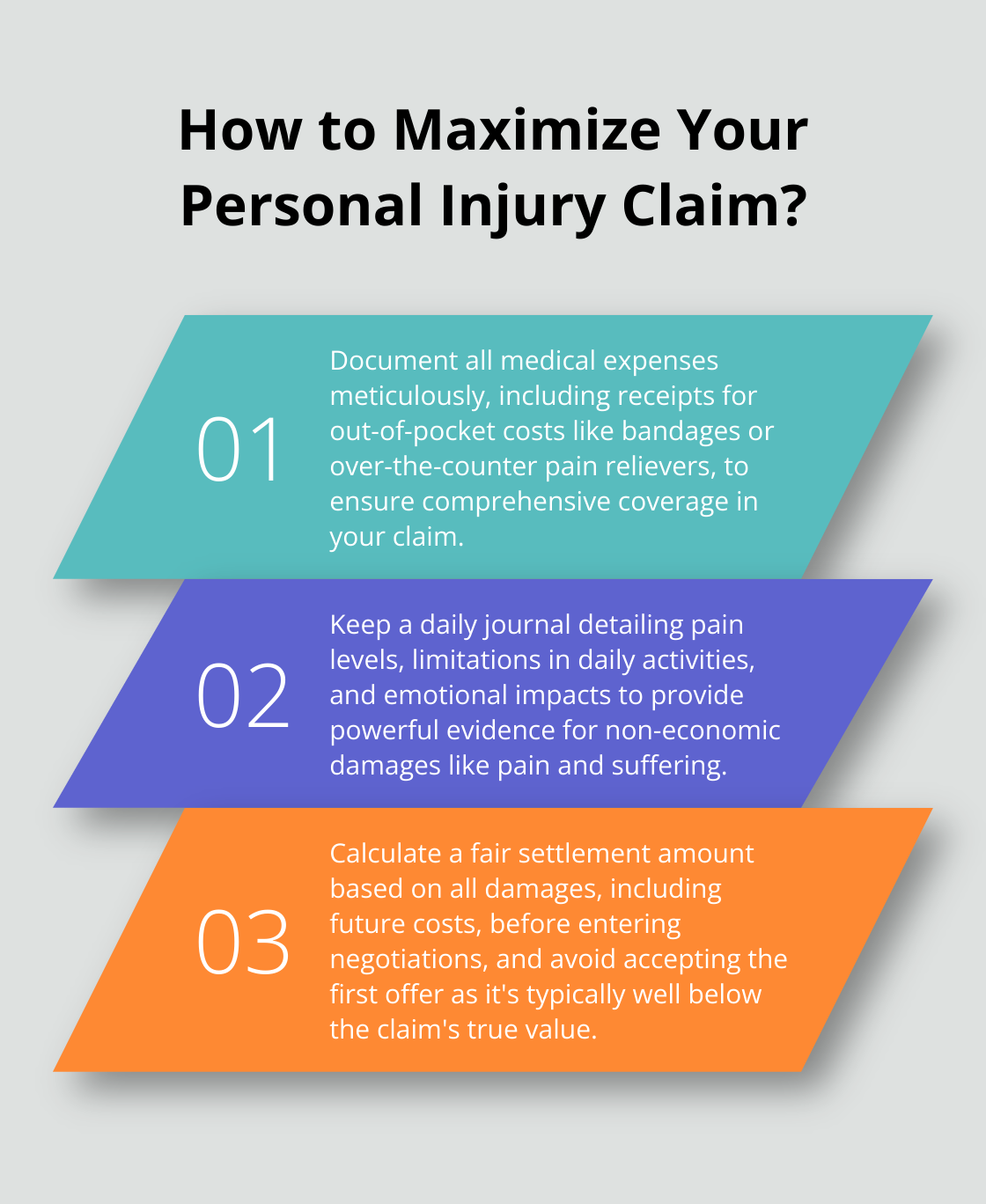
Personal Injury Compensation Explained
Personal injury compensation can be complex and overwhelming for victims. At Law Offices of Jeffrey A. Thompson, we understand the challenges you face after an accident.
This guide breaks down the types of compensation available and factors that influence settlement amounts. We’ll also explore the process of obtaining fair compensation, including the use of a personal injury compensation table to estimate potential damages.
What Compensation Can You Claim?
Personal injury compensation covers a wide range of damages. We help our clients understand and pursue all available forms of compensation to ensure they receive fair treatment after an accident.
Medical Expenses and Ongoing Care
Medical costs often form the largest part of a personal injury claim. This includes immediate emergency treatment, hospital stays, surgeries, medications, and rehabilitation. The National Safety Council reports that the average economic cost per medically consulted injury in 2022 was $40,000, though this can vary greatly depending on the severity of injuries.

We advise our clients to keep detailed records of all medical expenses, including receipts for out-of-pocket costs like bandages or over-the-counter pain relievers. Future medical needs are also considered. For instance, if you require ongoing physical therapy or future surgeries, these costs should factor into your claim.
Lost Income and Earning Capacity
Injuries can lead to significant time off work. The Bureau of Labor Statistics reports that in 2022, the median days away from work due to injuries was 10 days. Your claim should include wages lost during recovery and any bonuses or commissions you missed out on.
In cases of severe injuries that affect your ability to work long-term, we calculate the impact on your future earning capacity. This involves an assessment of your pre-injury income, age, skills, and the likelihood of career advancement. Economic experts may provide accurate projections of these losses.
Non-Economic Damages
Pain and suffering compensation addresses the physical discomfort and emotional distress caused by your injuries. While harder to quantify, these damages are essential. The impact on your quality of life, such as the inability to enjoy hobbies or participate in family activities, falls under this category.
Some states use a multiplier method to calculate pain and suffering, often ranging from 1.5 to 5 times the economic damages. However, this varies widely based on individual circumstances and jurisdiction.
Property Damage
If your personal property sustained damage in the accident, compensation for repair or replacement should be included in your claim. This most commonly applies to vehicle damage in car accidents.
We meticulously document all forms of damages to build a comprehensive claim. Our goal is to secure full and fair compensation that truly reflects the impact of the injury on your life.
As we move forward, it’s important to understand the factors that can affect the amount of compensation you may receive. These factors play a significant role in determining the final settlement or award in your personal injury case.
What Impacts Your Compensation Amount?
Personal injury compensation amounts vary significantly based on several key factors. Understanding these elements helps you set realistic expectations and work effectively with your legal team to maximize your potential recovery.
Injury Severity and Long-Term Effects
The severity of your injuries plays a crucial role in determining compensation. More severe injuries typically result in higher medical bills, longer recovery times, and greater impact on your daily life. The National Spinal Cord Injury Statistical Center reports that the lifetime costs for a person with high tetraplegia (C1-C4) can reach $4,724,181. This stark figure underscores the importance of thorough medical documentation for your claim.

Long-term or permanent disabilities significantly increase compensation amounts. If your injury results in chronic pain, reduced mobility, or the need for ongoing care, your claim should reflect these future costs and life changes. Medical experts can help project these long-term needs accurately.
Liability and Negligence Considerations
The degree of fault in your case directly affects compensation. In states with comparative negligence laws, your award may decrease by your percentage of fault. For instance, if you’re found 20% at fault in a $100,000 claim, you might only receive $80,000. Clear evidence of the other party’s negligence strengthens your position in negotiations.
Some states have modified comparative negligence rules. In Massachusetts, for example, you can recover damages as long as you’re not more than 51% at fault. This nuance highlights the importance of working with attorneys who understand local laws and can build a strong case for liability.
Insurance Policy Limits
Insurance policy limits often cap the amount of compensation available. The Insurance Information Institute reports that the average auto liability claim for bodily injury was $24,211 in 2022. However, if the at-fault party has minimal coverage, you might need to explore other options to fully cover your losses.
Investigating all potential sources of compensation (including umbrella policies or pursuing claims against multiple parties) becomes necessary if applicable. In cases where insurance coverage is insufficient, pursuing the at-fault party’s personal assets may become a consideration.
Economic Factors
The economic impact of your injury extends beyond immediate medical costs. Lost wages, reduced earning capacity, and potential career changes all factor into your compensation. The Bureau of Labor Statistics provides data on average wages across industries, which can help quantify these losses.
For example, if a construction worker (with an average annual wage of $55,350 as of 2022) suffers a permanent disability that prevents them from returning to their field, the long-term economic impact could be substantial. Your legal team should account for these factors when calculating your claim.
Quality of Legal Representation
The expertise and experience of your legal representation can significantly impact your compensation amount. Skilled attorneys (like those at Law Offices of Jeffrey A. Thompson) know how to build strong cases, negotiate effectively with insurance companies, and present compelling arguments in court if necessary.
They also understand the nuances of local laws and precedents that can affect your case. This knowledge allows them to develop strategies tailored to your specific situation, potentially leading to higher compensation amounts.
As we move forward, it’s essential to understand the process of obtaining this compensation. The next section will outline the steps involved, from gathering evidence to potentially filing a lawsuit.
How to Secure Your Personal Injury Compensation
Obtaining fair compensation for your personal injury claim requires a strategic approach and attention to detail. This process involves several key steps to maximize your chances of a favorable outcome.
Build a Strong Foundation
The first step in securing compensation is to gather comprehensive evidence. This includes medical records, police reports, witness statements, and photographic evidence of injuries and accident scenes. The National Association of Insurance Commissioners provides aggregate annual statement data for property/casualty, life/health insurance companies, all HMOs and companies that write accident and health insurance.

We recommend keeping a daily journal detailing pain levels, limitations in daily activities, and emotional impacts. This personal account can serve as powerful evidence, especially for non-economic damages like pain and suffering.
Navigate Insurance Negotiations
Insurance companies often attempt to minimize payouts. The Insurance Research Council has documented the costly consequences of attorney involvement in auto injury claims. Experienced attorneys leverage years of experience to counter lowball offers and negotiate effectively.
Start by calculating a fair settlement amount based on all damages (including future costs). This serves as a baseline for negotiations. It’s important to avoid accepting the first offer, as initial proposals are typically well below the claim’s true value.
Consider Litigation When Necessary
If negotiations stall, filing a lawsuit may become the next step. The American Bar Association states that only about 5% of personal injury cases go to trial. However, being prepared for this possibility often strengthens your negotiating position.
Filing a lawsuit involves drafting and submitting a complaint, engaging in discovery (where both sides exchange information), and potentially participating in mediation or arbitration. Throughout this process, continue to negotiate, as many cases settle before reaching the courtroom.
Seek Expert Representation
Working with a skilled personal injury attorney significantly impacts the outcome of your case. The National Center for State Courts found that represented plaintiffs receive an average of 60% more in damages than those without legal counsel.
Expert attorneys handle all aspects of your claim, from evidence gathering to courtroom representation if necessary. Their expertise allows you to focus on recovery while they navigate the legal complexities of your case.
Final Thoughts
Fair compensation after a personal injury supports your physical, emotional, and financial recovery. The process involves various damage types and factors that influence the final amount. A personal injury compensation table helps estimate potential damages, but each case remains unique.

Professional legal representation offers significant benefits throughout the claims process. At Law Offices of Jeffrey A. Thompson, we bring extensive experience in personal injury law to help our clients navigate these challenging situations. Our team understands the intricacies of Massachusetts law and how to build strong cases that maximize compensation.
Personal injury victims should gather comprehensive evidence, seek appropriate medical care, and consult with a qualified attorney. Insurance companies often try to minimize payouts, which makes skilled legal advocacy essential. We at Law Offices of Jeffrey A. Thompson provide compassionate, knowledgeable, and dedicated legal representation tailored to your specific needs.


